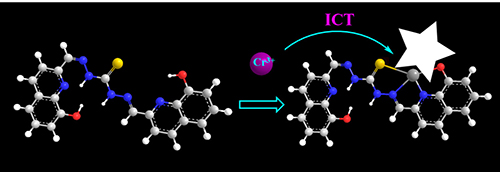摘要/Abstract

Cr3+离子在脂肪、核酸、糖和蛋白质的代谢中发挥着重要作用,并且Cr3+离子被认为是一种致癌物质,对人类有极大的危害.因此,通过将8-羟基喹啉醛和硫代碳酰肼反应制备出化合物L.探针L的CH3CN/H2O (V:V=1:2,Tris buffer 50 mmol/L,pH=7.3)溶液中加入Cr3+离子,可以通过肉眼观察到其颜色从无色到黄色的变化和明显的荧光增强效应,这些现象表现出探针L对Cr3+离子具有良好的选择性.根据Job曲线、荧光滴定、质谱和密度泛函理论(DFT)计算确定了探针L与Cr3+离子形成1:1的络合物.络合常数为1.00×105 L/mol,检测限为2.85×10-7mol/L.此外,生物成像实验表明,探针L可以通过荧光增强信号检测活细胞中的Cr3+离子.
关键词: Cr3+, 荧光探针, DFT, 细胞成像
Trivalent chromium (Cr3+) plays an important role in the metabolismof fats, nucleic acids, carbohydrates and proteins. Moreover, Cr3+ is considered to be a carcinogen and is extremely harmful to humans. Therefore, Cr3+ fluorescent probe L was synthesized by reaction of 8-hydroxyquinolinaldehyde with thiocarbazone. The probe L showed high selectivity towards Cr3+ ion through the color of solution changed from colorless to yellow for naked-eye detection and significant fluorescence intensity enhanced in CH3CN/H2O (V:V=1:2, Tris buffer 50 mmol/L, pH=7.3) solution. The 1:1 binding stoichiometry between probe and Cr3+ was determined from Job's plot, fluorescence titration, ESI-MS and density functional theory (DFT) calculations. The association constant (Ka) and the detection limit for Cr3+ were found to be to be 1.00×105 and 2.85×10-7 mol/L, respectively. Moreover, bioimaging experiments showed that L could sense Cr3+ ion in living cells with a fluorescence enhancement signal.
Key words: Cr3+, fluorescent probe, DFT, bioimaging
PDF全文下载地址:
点我下载PDF
